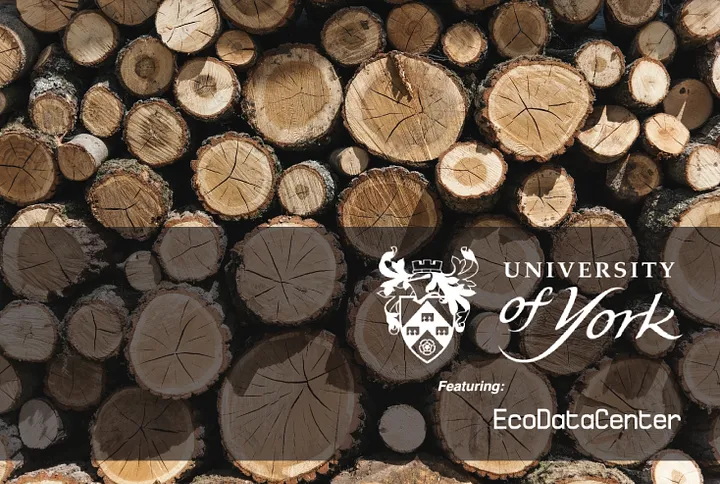The University of York is undertaking a commitment to achieving Net Zero emissions by 2030. As part of its plan, the Research Computing team has begun to look critically at its supercomputing services, seeking out the opportunity to get a head start in minimising their carbon footprint by working with EcoDataCenter.
“Sustainable research IT is a key tenet of the University of York ,” said Dr Emma Barnes, Head of Research IT at the University of York, “and in order to achieve this we need to look at all aspects of the service that we provide to our users. Historically this has meant that we looked at optimising the performance of both hardware and software, but now there is a need to address broader challenges. Specifically, we need to look at the environmental impact of our work, so our team got together with our managed service provider, Alces Flight, and we asked ourselves what we could do to expedite positive change by making our supercomputing part of the ‘Green HPC’ movement.”
With their current cluster nearing decommission in late 2023 , the Research Computing team sought to better understand the specific needs of their users so as to make decisions that could reduce their carbon footprint. “We looked at current and future requirements, and realised that our users were not overly-impacted by latency between the desktop and the HPC resource,” Emma added. “This meant we weren’t tied to keeping it in a specific geographic region and could instead explore data centres that harnessed renewable energy sources. Thankfully, these data centres also provide cheaper energy, especially when considering long-term fixed contracts.”
“When we started looking at the next iteration of our HPC facility, we realised a major challenge was finding a co-location facility that met our requirements and budget. I threw in the idea to look at the Nordics, and Alces were extremely helpful in identifying EcoDataCenter as a facility that met our needs and aligned with our values. Given the University’s strong commitment to net-zero, and the fact we will be doing climate research on this facility, it was extremely pleasing to find a partner so focussed on environmental sustainability, and with the capability and maturity to deliver. So much time is spent talking about sustainability, and it’s exciting to be doing, and to be leading the Russell Group on sustainable research computing facilities.”
Richard Fuller, Assistant Director of IT, University of York
From Woodlands to Workloads
The Research Computing team, alongside Alces Flight, worked together to explore renewable energy data centers located within the UK/EMEA regions. Their search led them to Sweden, and EcoDataCenter, a company whose focus is to revolutionise data centres through a sustainability-first approach. “We started on the journey to sustainable computing over ten years ago,” said Dan Andersson, CEO of EcoDataCenter. “Our process has developed quite literally in the middle of our woodlands, where we have abundant renewable energy sources close to hand. However, for us sustainable computing is not just about sourcing sustainable energy — it’s about reusing as much waste energy as we can, and that’s why we have built our Falun data centre next to a combined heat and power plant. At Falun, residual heat from servers is used to dry wood pellets that in turn can be used to generate energy, as and when it is needed . We also thought a lot about the construction of the data centre. We are the world’s first data centre built in wood which further brings down our CO2 footprint. Our partnership with Alces Flight and the University of York offers us an opportunity to work with a public institution to demonstrate just what is possible — we look forward to sharing that knowledge with the global HPC community.”
Ready for flight
The choice of data centre for York’s private research cloud was easy thanks to EcoDataCenter’s policy of transparency in their CO2 reporting. “Alces Flight is committed to helping its customers reduce their carbon footprints. A key concern is that we give them good advice based on solid evidence rather than passing on a ‘green-washed’ marketing message,” said Cristin Merritt, CMO at Alces Flight “We have worked with the University of York for many years, and have a great working relationship with their team. When we discussed re-locating their solution, we were able to look at historical data with the University to understand requirements in terms of latency and bandwidth to remote sites. It didn’t take us long to build a great commercial and technical relationship with EcoDataCentre, so it’s now just business as usual in terms of running and managing York’s new system.”
York’s Research Computing team has utilised Alces Flight Managed Services since 2017. Throughout this time, the team has sought to find the best means to offer HPC services to their multi-disciplinary user-base using both public and private cloud resources.
“Like many leading Universities, York hosts workloads from across traditional HPC and non-traditional data analytics fields — the latter driven by new AI and ML applications,” said Cristin. “This is a great opportunity for us to gain holistic knowledge on how to optimise system usage, provide green computer resources and minimise costs. That enables us to help our customers in making long-term decisions that can have a tangible impact for the wider HPC community and global CO2 emissions.”
Download the complete story here. (No registration required.)


